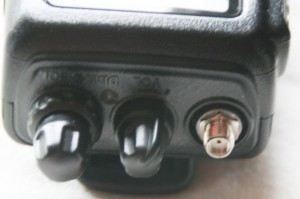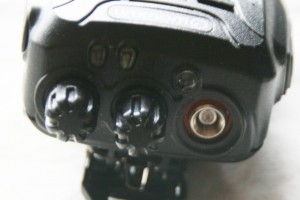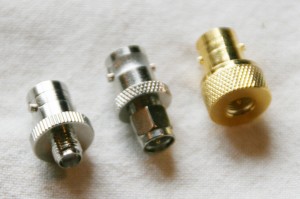Author Archive
 The World’s First Disposable HT
The World’s First Disposable HT
 A few weeks back, I was
A few weeks back, I was wasting time doing important research on the internetz when I came across the Baofeng UV-5R Dualband Handheld Transceiver. This radio seemed to have a boat load of features but the sale price was $65. So I am thinking to myself, just how good is a $65 radio?
The last time I went out to a nice restaurant, I blew through $65 pretty quickly so this was not going to be a large purchase. In fact, I realized that we now have HT’s priced low enough to be an impulse buy. As one of my ham buds told me, “filling up the gas tank of my truck costs more than this radio!”
So, of course, I soon broke down and ordered one and it showed up on my doorstep a few days later. I’ve been using it off and on for a few weeks now. I’ve also noticed that there is a real buzz on the interwebz about this little radio. There is usual Yahoo Group (baofeng_uv5r) and youtube videos.
Here’s the short story:
While not perfect, for $65, this radio is impressive.
Besides using the radio and receiving good signal reports, I did check the receive sensitivity, transmit power and frequency — all good. There are quite a few reviews out there, so take a look at articles by W0HC, PD0AC and OE1RFC. Also, there have been quite a few reports of quality problems with this radio…probably more defects than equipment from the more established ham equipment vendors. See the Yahoo Group discussion to understand this better.
Similar to other radios from China, this radio has a quirky user interface…not as easy to use as my Yaesu FT-60. This means that the programming software is a necessity to get the radio set up correctly, which is the major downfall of the rig. The free software program is crapware, with many people reporting a variety of problems with installation and operation. I did finally get it to work, but it was very frustrating.
I find myself grabbing this HT when I head out the door and leaving my other radios sitting in the desk charger. Someone pointed out to me that the low price of this radio makes it an easy choice — if it gets dropped, broken, lost or stolen, I am only out a tank of gas. While I am kidding about the “disposable radio” idea, the low cost does affect how I use it.
73, Bob K0NR
 Update to the FM VHF Operating Guide
Update to the FM VHF Operating Guide
I did a little updating on my FM VHF Operating Guide. Take a look.
Your feedback is appreciated.
73, Bob K0NR
 Part II: Say Goodbye to the BNC
Part II: Say Goodbye to the BNC
I had previously commented on the how most of the handheld radios are adopting SMA connectors instead of BNC connectors. See Say Goodbye to the BNC. For example, the Yaesu FT-60 uses a female SMA connector for the antenna connection. I’d say this is the standard approach for the amateur radio market.
A few manufacturers have decided to use the male SMA connector as the antenna connection for their handheld radios. I suspect that these manufacturers are following the lead of commercial manufacturers (e.g., Motorola) who use the male connector.
Many hams will want to adapt these SMA connectors back to the good old BNC, to connect to existing BNC connectors or HT antennas. I had commented that these adapters are mechanically weak but recently I have come across some more sturdy adapters.
The adapter in the center is the common adapter for cable use but arguably mechanically weak for adapting HT antennas. The adapter on the left adapts BNC antennas to an HT with a male SMA connector. The adapter fits snugly on the top of the HT and provides mechanical support. Similarly, the adapter on the right adapts BNC antennas to an HT with a female SMA connector.
The adapter on the left is available from Import Communications. The other two adapters came from Affordable Radio.
I have just started to use these more capable adapters so I am not sure how reliable they are in regular use. In any case, it makes sense to be careful to minimize the strain on any radio connector.
73, Bob K0NR
 The Next Step in Electronic Communication
The Next Step in Electronic Communication
 It figures: I just get done blogging about the history of electronic communications and Google takes the topic to the next level. Recognizing the inherent problem of cramming a QWERTY keyboard onto a Smart Phone, Google has gone back to the future by adopting a simple binary input device that uses DOTS and DASHES. That’s right, the new Gmail Tap uses Morse Code.
It figures: I just get done blogging about the history of electronic communications and Google takes the topic to the next level. Recognizing the inherent problem of cramming a QWERTY keyboard onto a Smart Phone, Google has gone back to the future by adopting a simple binary input device that uses DOTS and DASHES. That’s right, the new Gmail Tap uses Morse Code.
Google has apparently rediscovered what CW operators knew all along: Morse Code is extremely efficient for text communication.
Go to the Gmail Tap web page to get the full story.
73, Bob K0NR
 The K0NR History of Electronic Communications
The K0NR History of Electronic Communications
Humans have always had a desire to communicate. They started out just talking to each other but then found that it was really handy to be able to write things down. This caused the invention of the alphabet and the training of English teachers to explain overly-convoluted rules of grammar.
In 1831, Joseph Henry was playing around with electric circuits and came up with the idea of a telegraph. We can imagine a simple system where ON means “time for dinner” and OFF means “not yet”. This wasn’t good enough for Samuel Morse, who invented the Morse Code which could use ON and OFF to represent the entire alphabet. This was the first digital code and was used for important messages such as “Laughing Out Loud”, later abbreviated to LOL. This was basically the same as modern text messaging but you needed a trained telegrapher to do it.
In 1875, an inventor named Bell decided that it would be better if you could just talk over the wires instead of messing around with Morse Code. This will be a recurring theme — whether to talk to other people or just send digital codes. Bell invented this thing called the telephone, which is still used today. Basically, a person could talk into one end of a wire and have his voice pop out of the other end.
Later a guy named Marconi came along with the idea that communication should not depend on wires. For example, it was quite inconvenient to drag a telephone wire behind a ship as it moved across the sea. Unfortunately, Marconi didn’t know how to do voice over the wireless, so he dropped back to using Morse Code. ON and OFF is a much easier way to go. Although there is a persistent rumor that Marconi intentionally used Morse Code to torment future generations of FCC Licensed Amateur Radio Operators, I can find no evidence of this. Some people argue that Nikola Tesla invented wireless but I think he had to be disqualified for overloading and shutting down the Colorado Springs power grid on numerous occasions.
Again, not wanting to be limited by trained telegraphers, voice communication (originally called Amplitude Modulation, but now known as Ancient Modulation) was invented. We are not sure who first came up with Ancient Modulation, but there are a bunch of radio hams on 75 Meters still trying to perfect it.
Somewhere around 1973, Motorola figured out that what the world really wanted was a portable phone that everyone could carry around in their pocket. The first attempt at this was the Motorola DynaTAC, which required an enormous pocket to carry it in. Knowing that customers were not going to enlarge their pockets, various mobile phone manufacturers worked feverishly to reduce the size of these phones.
Unfortunately, the mobile phone manufacturers terribly miscalculated, thinking that people would want to actually talk on these phones. As text messaging was added to these phones, it was discovered that most people, especially those under the age of 30, preferred to send cryptic text messages rather than actually talk to anyone. It was also discovered that all forms of human thought can be captured as 140 character messages. Although it was tempting to apply Morse Code to digital text messaging, it was rejected in favor of the ASCII 8-bit code. Instead of using ON/OFF keying, text messages are normally sent with a tiny keyboard patterned after a full-size typewriter (now obsolete).
73, Bob K0NR
P.S. I made up some of this stuff.
 Newsflash: Not Everyone Is Going to Be an Expert
Newsflash: Not Everyone Is Going to Be an Expert
You’ve probably run into this situation…some of the more experienced radio amateurs commenting about how so many of the newer hams are incompetent. “Yeah, they’ve dumbed down the FCC exam, so now anyone can get a license. Back when I got my license, I had to copy Morse Code in my head, design a triple-feedback-loop vacuum tube amplifier and recite the Gettysburg address backwards in front of an FCC examiner.”
A while back, I wrote about the time when a newbie on an email list asked a simple electronics question and got this reply: Not to pick on you, but is there any requirement these days to have a basic knowledge of electricity and/or radios to get a ham license?
Often this shows up as an elitist attitude of If you don’t pursue the hobby my way or at my level, then you are doing it wrong.
Since amateur radio consumes most, but not all, of my hobby time, it is easy to lose perspective on this. And, yes, I am sure I have complained about clueless newbies and LID operators from time to time.
It’s interesting to put the shoe on the other foot and think about activities that I pursue with much less time and intensity. In other words, think about activities where I am not that experienced and certainly not an expert.
For example, I enjoy fishing but I am really not that skilled at it. For me, fishing is just an excuse to sit next to a stream and enjoy the scenery. If I catch fish, that is a plus (but I always throw them back in anyway). When I encounter Real Fisherpersons, they are usually friendly and helpful, passing along a few tips on what they using for bait, etc. Sometimes I will encounter That Fly Fishing Guy that looks down his nose at any form of fishing that does not meet his high standard.
I also enjoy photography. I have a decent Canon DSLR camera with a few lenses and I manage to capture some reasonably good photos that way. (This probably has more to do with the quality of the camera than the photographer.) My interest is mostly to capture experiences and events in my life and create photos that I can use in my various writing activities. But I know a number of people that are infinitely more skilled than I am. They are generally very helpful and I usually manage to learn something from them. Come to think of it, I have not encountered very many condescending photographers — most of them have been very helpful. Maybe I have just been lucky.
Although it’s a cliche, Life is Too Short. There are so many things we can choose to do with our time and, really, so little time to do it. People must make choices about how deep they get into any activity, all while balancing family time and demands at work. It shouldn’t surprise us when some people choose to be part-time hams and don’t aspire to be the expert in all things radio.
And the final point is, if you think you have something to offer to the newbies, make sure you come across as helpful and make sure it looks like you are having fun. Being the Old School Grumpus will not attract people to your favorite activity. Having fun and inviting them in will!
73, Bob K0NR
 Use WPtouch to Create Mobile WordPress Site
Use WPtouch to Create Mobile WordPress Site
 I’ve been using WordPress for my weblog for years now and just turned on a mobile version of the blog. The WordPress plugin WPtouch makes this very easy to do. It took about 5 minutes to get it up and running.
I’ve been using WordPress for my weblog for years now and just turned on a mobile version of the blog. The WordPress plugin WPtouch makes this very easy to do. It took about 5 minutes to get it up and running.
The WPtouch plugin automatically detects when the user is browsing with a smartphone and implements the mobile interface. The user has the option of turning the mobile presentation off.
Highly recommended!
73, Bob K0NR















